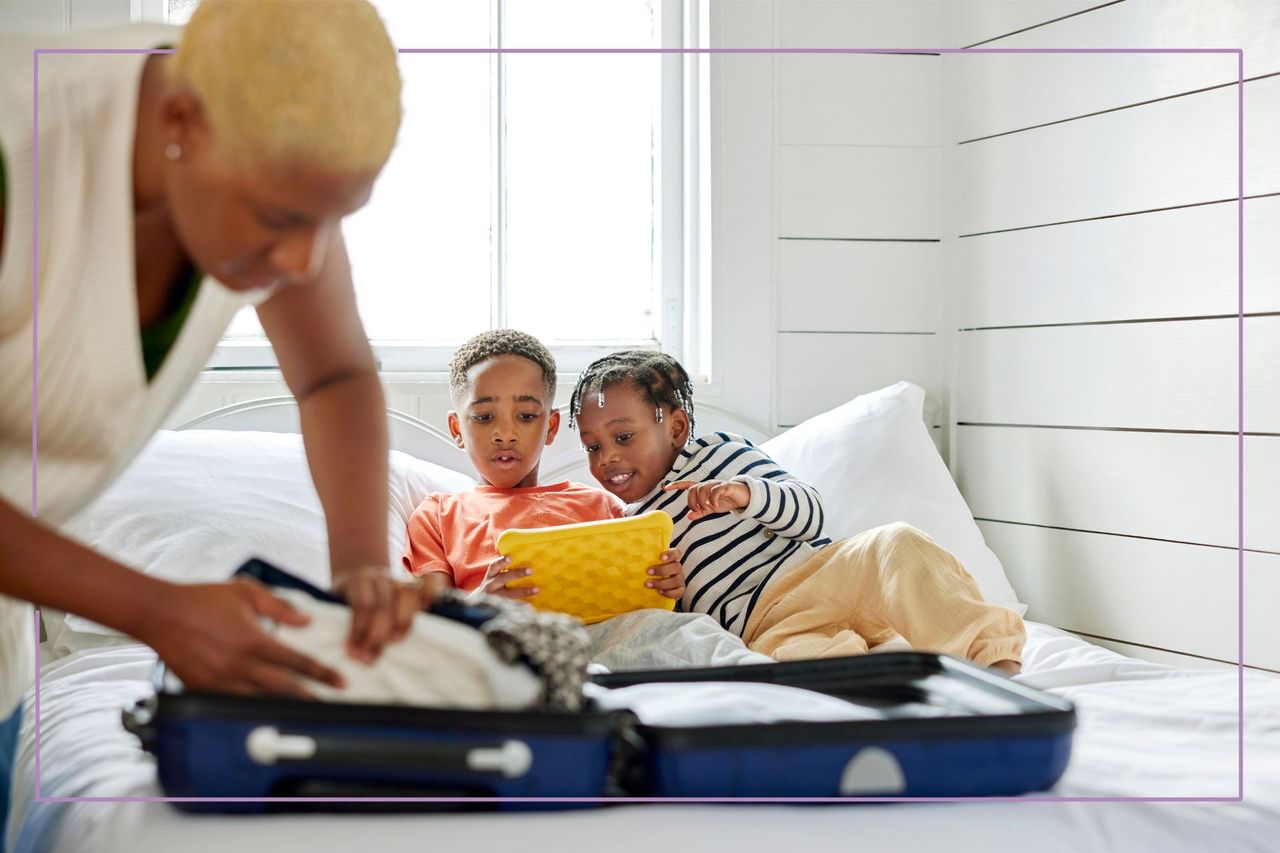"I resent packing for the family" - Expert shares 3 clever tips for kids to pack their own suitcase
Plus six ways to make it stress-free


Family holidays can be a wonderful time for family adventures, but we also know they can be a tad stressful, right? Especially on the run-up to the holiday itself...
From checking all the bookings, and passports to stocking up on the best sun cream for you and the family, and researching the best travel toys to invest in (ones that will keep them engaged for more than five minutes) - we know that the mental load increases. And, as with most things in life sometimes, it's just easier to do it yourself especially when it comes to packing.
However, if you're anything like GoodToKnow family editor, Stephanie Lowe, it's not your favourite thing. "I'm not sure how and when I became the unspoken 'designated packer' for the whole family and I totally resent it." Packing for the whole family doesn't have to be your sole job, I'm a developmental expert and I know that when it comes to packing suitcases, it's a great opportunity to teach children responsibility.
Involving your kids in organising and packing for holidays will lighten your load in the long run and help them develop crucial life skills. Here’s how to make the process fun and educational, tailored to their developmental stage.
Packing kids for trips - ideas to try
The first thing to focus on and understand is the developmental abilities of certain ages. Toddlers, ages 2-3 years can help with simple tasks like choosing a favourite toy or shirt. Pre-schoolers, ages 4-5 years can follow simple picture lists and help gather items. Kids, ages 6 - 10 years can handle written lists and pack most of their belongings with some supervision. And the tweens and teens, ages11+ years can take full responsibility for their packing with minimal guidance. This may feel hard now, but it's worth it in the long run, trust me.
- Start with family meeting
- Create packing lists together
- Gamify packing
1. Start with a family meeting
Kick off the packing process with a family meeting. Involve everyone, make sure they know their voice is important and their ideas will be heard. Explain where you're going, what the weather may be like, and the kinds of activities you'll be doing. This helps children understand the context for what they’ll need to pack. Bear these points in mind;
- Beach Holiday: Remind kids to pack swimsuits, sunscreen, hats, and beach toys. Explain the importance of sun protection and staying hydrated.
- UK Staycation: Depending on what you’re planning to do, ensure they pack layers, and clothes for indoor activities in case of potential rainy days as well as things to read or play with in the car as you travel. Discuss the potential for varied weather and the need to be prepared for different activities.
2. Create packing lists together
Involving children in creating their own packing lists is a fantastic way to teach organisation. For youngsters, you might provide pictures or stickers to illustrate alongside words, while older children can handle written lists.
GoodtoKnow Newsletter
Parenting advice, hot topics, best buys and family finance tips delivered straight to your inbox.
Make it a collaborative effort, for toddlers keep it simple - lists with pictures (e.g., a picture of a t-shirt, shorts, and a toothbrush). For school-aged kids a written list with categories (e.g., clothes, toiletries, toys). And for teens a more detailed lists including specific outfits and accessories for different activities.
Also look at this as a family activity, and share packing responsibilities. It’s worth dividing packing responsibilities based on age and ability, this might look like;
- Young Children (3-5 years): Give them small, manageable tasks like gathering their favourite (travel) toys or packing socks and underwear.
- Older Children (6-10 years): They can pack their own clothes and toiletries with some guidance.
- Tweens and Teens: Encourage them to take full responsibility for their packing, including checking items off their lists.
3. Gamify packing - make it fun
Kids love anything that's out of the ordinary and doesn't feel like a chore (adults do too tbf.) So, if you plan in advance and allow enough time, consider making packing into a game to keep it engaging. Allowing children to make decisions and learn from their mistakes is crucial. If they forget something, it’s a valuable lesson in planning and responsibility. Offer guidance but resist the urge to take over completely. Try these:
- Scavenger Hunt: Create a scavenger hunt where kids find items on their list around the house.
- Packing Race: See who can pack their items the fastest without forgetting anything.
- Packing Puzzles: Challenge kids to fit all their items into their suitcase in the most efficient way possible.
It's also worth bearing in mind a planning timeline, so two weeks before departure begin talking about the holiday and where you’re going. Have your family meeting to discuss the destination, likely weather, and the type activities you will all want to do.
Then, one week before departure create packing lists together. Older kids can start piling up items they want to take in a designated area. This is also a good time to identify items that need to be washed or repaired. Then a few days before departure start packing non-essential items. Ensure all laundry is done and involve older children in folding and organising their clothes. This is also a good time to do a final check to ensure nothing essential is left behind, making them responsible for their own checklists.
And, the final day before departure finalise packing, making sure all essential items are included. Double-check lists and encourage kids to review their packed items to ensure they haven’t forgotten anything.
Make packing with kids less stressful
- Use Clear, Positive Language: Instead of saying, “Don’t forget your toothbrush,” try “Remember to pack your toothbrush.”
- Set Realistic Expectations: Understand your child’s developmental abilities. Don’t expect a 5-year-old to pack as efficiently as a 12-year-old.
- Praise Effort, Not Perfection: Acknowledge their efforts with comments like, “Great job remembering to pack your swimming trunks!” This builds confidence and encourages them to keep improving.
- Teach Through Example: Show them how you pack your own suitcase, explaining your process as you go.
- Limit Choices to Avoid Overpacking: If your teen wants to pack loads of accessories, set a limit, like choosing three favourite items. This teaches decision-making and prevents overpacking.
- Help Young Kids Make Choices: If your little one can’t decide between five teddy bears, suggest taking one or two and explain how it makes more room for other important items.
Involving your children in the packing process is more than just a way to lighten your load—it’s an invaluable learning opportunity. By setting realistic expectations, using positive reinforcement, and making the process fun, you can teach your kids responsibility and organisational skills in a way that’s engaging and age-appropriate. Whether you're off to a sunny beach or exploring the UK, these tips will help ensure your family holiday starts off on the right foot.
Dr Amanda Gummer is a resident expert here on GoodToKnow and her work across our site is created to help parenting make sense. From the helpful Why do boys play with trucks? to the insightful 3 stages of play every kid needs not forgetting her four expert-approved ways to support autistic play - a great read!

Dr Amanda Gummer has a PhD in Neuropsychology, the Postgraduate Certificate in Higher Education and more than 20 years’ experience working with children and families. As such, she is renowned as an expert on all aspects of child development, including toys and play. In 2012, she founded The Good Play Guide, an independent, expert accreditation service for children’s products, including toys, apps and more.